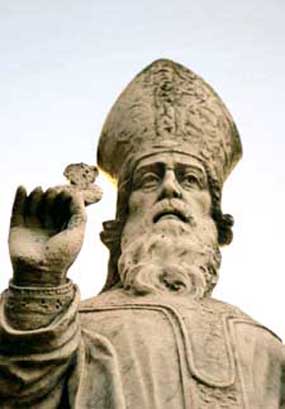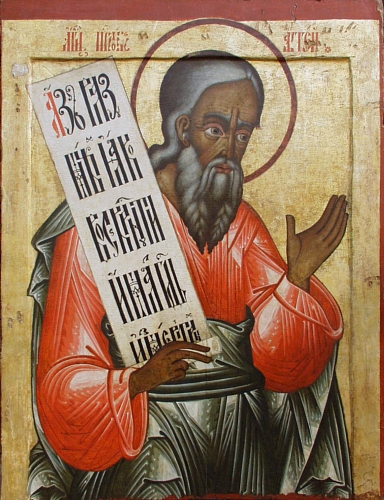When Christians reflect on the cross, we tend to forget, or perhaps even to ignore, an obvious truth: Jesus was a political prisoner, executed by the Roman state on the charge of insurrection. Rome didn’t crucify thieves, or bandits, or rapists, or even murderers. It crucified slaves, and those who rebelled against Roman authority. The words posted above Jesus’ head on the cross were not a title, but an accusation, the accusation that brought him to the cross: “Jesus the Nazarene, the king of the Jews.”
This past Friday, in a Spirit-filled service of worship at the Lived Theology Conference of Pittsburgh Theological Seminary’s Metro-Urban Institute, this truth was brought home to me through one of the most powerful messages on the cross of Christ that it has been my privilege to hear.
The preacher was the Rev. Dr. Allan Boesak, holder of the Desmond Tutu Chair of Peace, Global Justice and Reconciliation Studies at Christian Theological Seminary in Indianapolis, Indiana. Dr. Boesak was a key figure in the struggle to overcome apartheid in South Africa, and has continued to be a world leader in the battle for human rights.
His text was not any of the accounts of Jesus’ passion from the gospels, or reflections on the cross from Paul or any other New Testament writer. It came instead from the left-hand side of the Bible: an extremely disturbing story found in 2 Samuel 21:1-14. I confess that when I heard this text read, I at first thought that the young seminarian doing the reading had made a mistake–surely Dr. Boesak did not intend to preach on this horrific text! But he did.
In this passage, David hands over seven young men, sons and grandsons of Saul, to the Gibeonites–who execute these seven men and publicly display their broken bodies. Indeed, the NRSV says, “they impaled them on the mountain before the LORD. The seven of them perished together” (2 Sam 21:9).
Dr. Boesak first called into question the assumption raised in the text that David had acted in obedience to God’s will, expressed when David “inquired of the LORD” (2 Sam 21:9, NRSV). That word, he reminded us, would have come through priests and court prophets close to the palace–men no doubt sensitive to David’s lingering fear of a rebellion against his authority by Saul’s surviving sons and grandsons. The surrender of these seven young men to the vengeance of the Gibeonites, Dr. Boesak proposed, was no act of obedience. It was a politically sanctioned killing, an act of state-sponsored terror not unlike the Roman practice of crucifixion: a mode of torture that also left the victim hanging, exposed to the elements. The bodies of crucifixion victims were usually left unburied, to be eaten by wild animals (Marcus Borg and N. T. Wright, The Meaning of Jesus: Two Visions [San Francisco: HarperSanFrancisco, 1999], p. 89).
Confirming that David’s horrific act was not the will of God, this text does not say that God responded to the prayers of his people, or lifted the famine which had prompted David to inquire of the LORD in the first place, once the young men had been killed. Instead, “God responded to prayers for the land” (2 Sam 21:14, CEB) only after David responded to the protest against that killing raised by Rizpah, wife of Saul and mother to two of the murdered young men. Although she never speaks a word in this passage, Dr. Boesak calls Rizpah a prophet in the shadow of the cross.
What did Rizpah do?
Aiah’s daughter Rizpah took funeral clothing and spread it out by herself on a rock. She stayed there from the beginning of the harvest until the rains poured down on the bodies from the sky, and she wouldn’t let any birds of prey land on the bodies during the day or let wild animals come at nighttime (2 Sam 21:10).
Day after day, night after night, Rizpah stayed by the seven slaughtered men. She could not take them down and honor them with burial, but she sat in funeral clothes, mourning them, and driving away the wild animals and carrion birds so that they could not mutilate the bodies. Though only two of these had been her sons, Rizpah mourned for and honored them all, thinking, as Dr. Boesak said, Every child on a cross is my child. No one came to stand by her and help her–she was alone in her grief, and in her defiance of the king’s word. Some may have pitied her, even sympathized with her–but Sympathy is not solidarity.

Yet Rizpah prevailed. At last, shamed and moved by Rizpah’s faithfulness, David not only took down and buried those seven bodies, but also sought out the still-unburied bones of their ancestor Saul–and of Saul’s son and David’s beloved friend Jonathan. He honored them all with proper mourning and burial rites. Then–and only then–“Once everything the king had commanded was done, God responded to prayers for the land” (2 Sam 21:14).
Rizpah brought healing to her land, because she spoke truth to power from the shadow of the cross. Speaking from his own bitter and painful experience, Dr. Boesak said that this is the only way that we can speak truth to power: We cannot speak truth to power if our heart is in the palace. As Jesus himself said,
All who want to come after me must say no to themselves, take up their cross, and follow me. All who want to save their lives will lose them. But all who lose their lives because of me will find them Matt 16:24-25).
It was his own identification with the least and the outcast, and his opposition to the powers that be, that brought Jesus to his cross. But just as Rizpah stayed in the shadow of the cross, so the women who had followed Jesus from Galilee stayed in the shadow of his cross (Luke 23:49).

They stayed with Jesus until he died, and witnessed his hurried burial (Luke 23:55) in a borrowed tomb. As soon as they were able, “Very early in the morning on the first day of the week, the women went to the tomb, bringing the fragrant spices they had prepared” (Luke 24:1)–and so they became the first witnesses to Jesus’ resurrection!
This Holy Week, as we remember Jesus’ suffering and death for us, may we too resolve to stand with our Lord in the shadow of the cross, opposing as Jesus did every oppressor, standing as he did in solidarity with every oppressed sister or brother. Then we too may witness the glorious light of Christ’s resurrection, and share in the joy of his kingdom that has no end.



